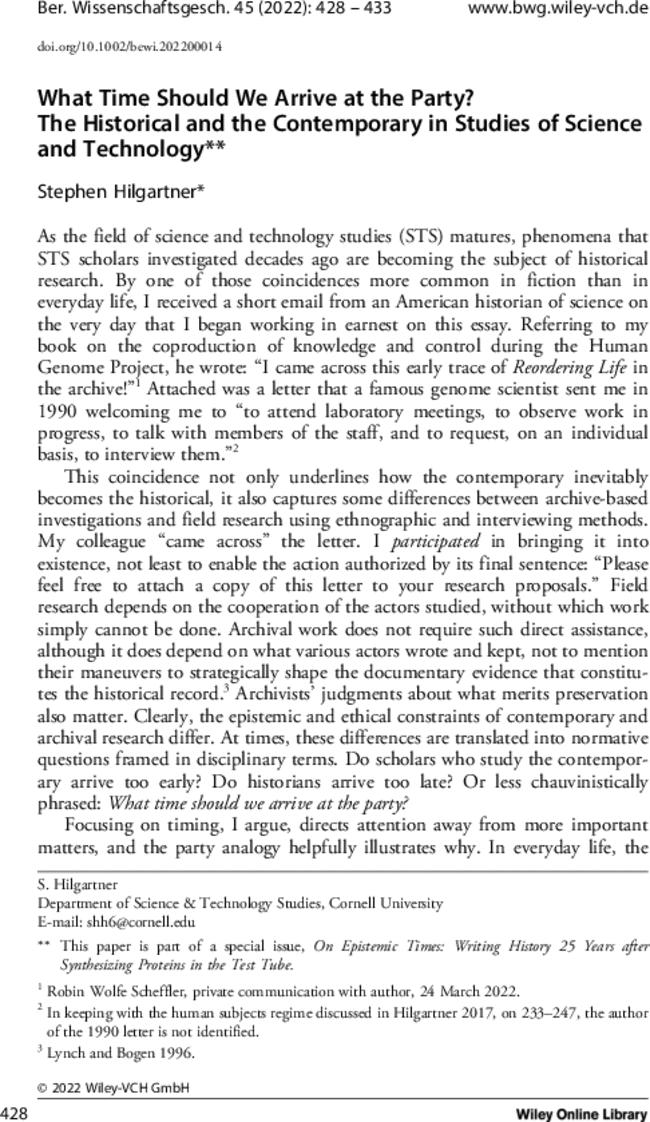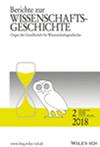What Time Should We Arrive at the Party? The Historical and the Contemporary in Studies of Science and Technology**
IF 0.4
2区 哲学
Q2 HISTORY & PHILOSOPHY OF SCIENCE
引用次数: 0
Abstract
As the field of science and technology studies (STS) matures, phenomena that STS scholars investigated decades ago are becoming the subject of historical research. By one of those coincidences more common in fiction than in everyday life, I received a short email from an American historian of science on the very day that I began working in earnest on this essay. Referring to my book on the coproduction of knowledge and control during the Human Genome Project, he wrote: “I came across this early trace of Reordering Life in the archive!” Attached was a letter that a famous genome scientist sent me in 1990 welcoming me to “to attend laboratory meetings, to observe work in progress, to talk with members of the staff, and to request, on an individual basis, to interview them.” This coincidence not only underlines how the contemporary inevitably becomes the historical, it also captures some differences between archive-based investigations and field research using ethnographic and interviewing methods. My colleague “came across” the letter. I participated in bringing it into existence, not least to enable the action authorized by its final sentence: “Please feel free to attach a copy of this letter to your research proposals.” Field research depends on the cooperation of the actors studied, without which work simply cannot be done. Archival work does not require such direct assistance, although it does depend on what various actors wrote and kept, not to mention their maneuvers to strategically shape the documentary evidence that constitutes the historical record. Archivists’ judgments about what merits preservation also matter. Clearly, the epistemic and ethical constraints of contemporary and archival research differ. At times, these differences are translated into normative questions framed in disciplinary terms. Do scholars who study the contemporary arrive too early? Do historians arrive too late? Or less chauvinistically phrased: What time should we arrive at the party? Focusing on timing, I argue, directs attention away from more important matters, and the party analogy helpfully illustrates why. In everyday life, the

我们应该什么时候到达聚会地点?科技研究的历史与当代**
本文章由计算机程序翻译,如有差异,请以英文原文为准。
求助全文
约1分钟内获得全文
求助全文
来源期刊

Berichte zur Wissenschaftsgeschichte
社会科学-科学史与科学哲学
CiteScore
0.80
自引率
16.70%
发文量
43
审稿时长
>12 weeks
期刊介绍:
Die Geschichte der Wissenschaften ist in erster Linie eine Geschichte der Ideen und Entdeckungen, oft genug aber auch der Moden, Irrtümer und Missverständnisse. Sie hängt eng mit der Entwicklung kultureller und zivilisatorischer Leistungen zusammen und bleibt von der politischen Geschichte keineswegs unberührt.
 求助内容:
求助内容: 应助结果提醒方式:
应助结果提醒方式:


